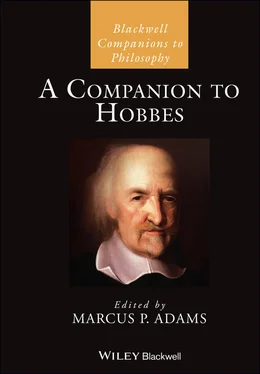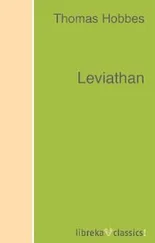Taylor’s thesis, which understood Hobbes’s civil philosophy as logically separate from the other parts of his philosophy, weighed against seeing Hobbes as offering a system; or if Hobbes did offer a system, it was an incoherent one. 16Thus, against Taylor’s thesis, defenders of the view that the parts of Hobbes’s philosophy were deductively dependent upon one another either embraced that Hobbes’s system was guilty of the naturalistic fallacy (Peters) or attempted to show that Hobbes never really meant to offer moral claims but instead gave something less than this, akin to a prescription from a physician (Watkins). More recently, A.P. Martinich (2005) argues against views that hold that there is no deductive relationship between the parts of Hobbes’s philosophy by focusing on how Hobbes’s understanding of human beings must relate to De corpore : “men are bodies, and thus what Hobbes says about men in De homine has to follow from what he says about bodies in De corpore ” (2005, 172).
Another understanding of Hobbes’s system with affinities to the deductivist account understands him as a type of reductionist. For example, Marjorie Grene argues that according to Hobbes “the only meaningful hypotheses are such as reduce all phenomena to material or, in modern language, to physico-chemical terms” and the reduction happens by reducing “wholes to parts” (1969, 9–10). On Grene’s account, there are natural and artificial wholes needing to be reduced, and the role of philosophy is to do just that. The commonwealth or the system of civil laws in a commonwealth would be an example of an artificial whole needing to be reduced:
They are language systems which constitute sciences when applied to sense, or legal systems invented to assuage our fears and satisfy our needs: needs and fears which, in turn, reduce to a sum of “endeavors” or least motions of our bodies to and from other bodies which have in turn caused such minute internal movements.
(Grene 1969, 10)
Such a system, Grene argues, dismisses the “oughts” of morality and offers in the laws of nature (agreeing with Watkins) prescriptions that will aid humans in satisfying their appetite for peace. Although differing on the details of Hobbes’s moral and political philosophy, Jean Hampton likewise understands Hobbes as a type of reductionist. Hampton claims that according to Hobbes “[a] materialist explanation of an event will always be in terms of the operation of fundamental physical objects in accordance with laws” and furthermore that Hobbes held that “it is possible to reduce both ethical and psychological language to talk of matter, motion, and the laws of nature” (1986, 12).
There are problems with the deductivist and reductionist interpretations. I will mention the most significant for the deductivist interpretation here. The difficulty is a logical one related to how Hobbes understands deduction and the nature of truth. Hobbes understands deduction as a process of showing containment relationships among categories. According to Hobbes’s account in De corpore III.7, truth is a property of propositions, and a true proposition is one in which the “predicate contains the subject within itself” (Hobbes 1981, 233; OL I.31). So “All men are mortals” is true just in case ‘men’ is contained within ‘mortals.’ Truth is carried through the premises of a syllogism when the proper containment relationships are maintained in each premise.
This account of truth exposes a difficulty for deductivist attempts to make sense of how the parts of Hobbes’s philosophy fit together, but to see this we will need to consider how he describes some parts of philosophy as more “abstract” than others. Hobbes differentiates disciplines like geometry and natural philosophy by stating that the former is abstract and the latter concerns real bodies as they exist in the world. 17Hobbes allows abstraction wherein one considers a body in the imagination as if it had a feature removed, such as considering ‘thinking’ alone by abstracting away ‘human body.’ However, he criticizes those who claim that in doing so they have demonstrated that a feature like ‘thinking’ can exist independently from a body:
The gross errors of certain metaphysicians take their origin from this; for from the fact that it is possible to consider thinking without considering body, they want to infer that there is no need for a thinking body…. (Hobbes 1981, 231; OL I.30)
Expanding this picture, we could view Hobbes’s system of philosophy as organized from more abstract (first philosophy) to less abstract (civil philosophy), and now the problem for any deductivist account should be clearer: if the alleged deduction is supposed to be from the more abstract discipline, then where does the information about the less abstract discipline enter? For example, a principle in geometry is something “abstract” insofar as it does not relate directly to bodies in the actual world; bodies that interact with one another are not composed of geometric ‘points’ or ‘lines’ but rather have different densities, weights, and apparent colors, and also inhabit media of different densities. If a deduction is to be offered, where in the “abstract” will we find these features of actual bodies contained ? 18
Certainly, what Hobbes claims about bodies in general will hold about humans when humans are considered simply as bodies , but these claims will not explain actions of human bodies considered as human bodies ( pace Martinich 2005, 172). In other words, the information relating to human bodies will not be contained within true propositions related to bodies in general (i.e., bodies as bodies). For example, if I want to understand why some human body plummets rather than floats when leaving the top of a tall building, I could consider it as a body and explain the falling rather than floating by appealing to physical causes (just like I would if I were explaining an inanimate body falling from that building). However, if I want to understand why that human body climbed the stairs to the top of the building and jumped with a bungee cord attached (also initially plummeting), I must also consider that human body as a human body and then uniquely human features become relevant (such as appetites and aversions). 19
This significant difficulty notwithstanding, the deductivist and reductionist interpretations offer a familiar picture, at least to twenty-first century readers, of how of we might understand a materialist worldview. Twenty-first century readers are used to asking questions like “Does the mind reduce to the brain?” or “Does biology reduce to physics?” Since Hobbes holds that all that exists is matter, modern readers may feel tempted to ascribe a reductionist view to Hobbes, looking backward with contemporary concerns and thrusting them upon his philosophy. But seventeenth-century materialism, like today’s materialism, was not monolithic, and there was disagreement among materialists concerning the nature of matter and how that matter behaved, like between Hobbes and vitalist-materialist Margaret Cavendish. Rather than risking “casting out the baby with the bath water,” as Taylor seems to do when asserting that Hobbes’s civil philosophy has no logical connection to his philosophical psychology or other parts, such as natural philosophy, perhaps it is still possible to salvage the idea that Hobbes’s philosophy is systematic. The remains of this section will briefly mention alternative models of the structure of Hobbes’s philosophy. These prospective ways of unifying Hobbes’s philosophy ascribe less unity than the deductivist or reductionist accounts, but they avoid discarding unity altogether.
Two chapters in this volume directly discuss ways of understanding the unity of Hobbes’s philosophy without committing him to deductivist or reductionist views. Hattab (Chapter 1) argues that for Hobbes there are two types of method at play in his philosophy: first, a universal method concerned with the ordering of concepts and definitions before one begins the work of discovery or teaching in a subject; and second, a particular method used to demonstrate conclusions. The first method, Hattab shows, provides the philosopher with principles that can be drawn upon in applications of the particular method within specific disciplines. Adams (Chapter 4) argues that although there is no deductive or reductive relationship between geometry and optics or geometry and natural philosophy, Hobbes held that there was a type of unity nonetheless. Adams argues that in explanations in optics and natural philosophy, one considers natural bodies as if they were mathematical and can then borrow causal principles from geometry. Hobbes identifies this type of explanation as “mixed mathematics” and calls it “true physics.”
Читать дальше












